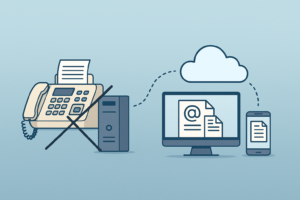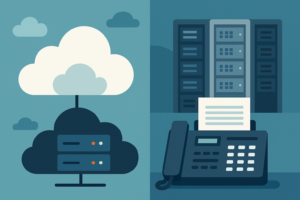With so many high profile data breaches making the news recently, it is understandable why some industries are hesitant about adopting new technology that might put their employees and customers at greater risk for cybercrime. Most sectors have compliance regulations that must be met, and some, like health care, are very strict. In particular, the Health Insurance Portability and Accountability Act lays out very specific guidelines about how patients' medical information must be handled and imposes harsh penalties if the requirements are not met.
Despite the risks of cybercrime, embracing some level of technology is unavoidable in this day and age. Hospitals and doctor's offices are using electronic health records, for instance, in an attempt to provide their patients with a better level of care, and in doing so have to employ some type of digital storage solution. Using the cloud to store medical files would seem like the obvious choice, but overall the health care industry has lagged behind other sectors on adopting the technology, whether due to concerns about security and privacy or simply because of a lack of tech knowledge.
Increasing productivity with technological advancements
According to information released by the Bureau of Labor Statistics, the health care industry has seen some of the highest employment growth in the U.S. since 2002, and it is expected to continue outpacing other sectors through 2022. While the industry is growing, however, it has not managed to access the gains in productivity that other leading industries have seen over the past few years. One reason for this is a reluctance to adopt devices and programs that would aid in increasing productivity.
As new technological innovations continue to emerge that could benefit health care, a schism has begun to form between the clinical side of the industry and the fitness and wellness side. The former has strict instructions to protect patient data and is deeply invested in information privacy and security. The latter is increasingly focused on data aggregation and analytics, requiring them to collect and share as much information as possible. As users of such services begin to realize the value of sharing their data, they will likely want to have similar access from more traditional health care providers.
 Health care organizations will benefit greatly from implementing secure cloud computing services.
Health care organizations will benefit greatly from implementing secure cloud computing services.Look to the cloud to close the health care gap
Now is an ideal time for health care organizations to start embracing cloud computing, as it is the one of the only ways to close the gap between the two sides of the industry and provide the services required by both. According to a report released by Persistence Market Research, the cloud offers health care organizations a variety of benefits in multiple departments.
"Healthcare cloud computing facilitates faster accessibility of electronic medical records and large storage of medical information in hospitals and clinics," the report reads. "Cloud computing also plays a vital role in patient billing and reduces capital expenditure which is associated with conventional mode of billing practices."
By utilizing a cloud platform, health care organizations can share pertinent health information more easily across a variety of channels while still keeping sensitive personal information stored securely. One of the most beneficial aspects of the cloud is all of the additional services than can now be accessed. A variety of different functions and business processes can be carried out through these services and one in particular can help health care organizations share patient data more securely.
"FoIP creates a more secure form of health care communication."
Health care providers in need of a better way to send and store patient information can implement a fax-over-IP solution and stop worrying about falling victim to data breaches and meeting compliance standards. FoIP allows organizations to send faxes over the Internet, creating a more secure form of communication and an up-to-date archive of information. When messages are sent with a FoIP service, the contents are stored in the organization's dedicated server. Any document sent or received through the service then becomes part of a searchable, cloud-based archive that offers increased security and ease of access.
Enhance enterprise communication, collaboration and compliance efforts with a proven FoIP solution from FaxCore. Contact FaxCore today to learn more about their 'Partly-Cloudy' fax solutions.




